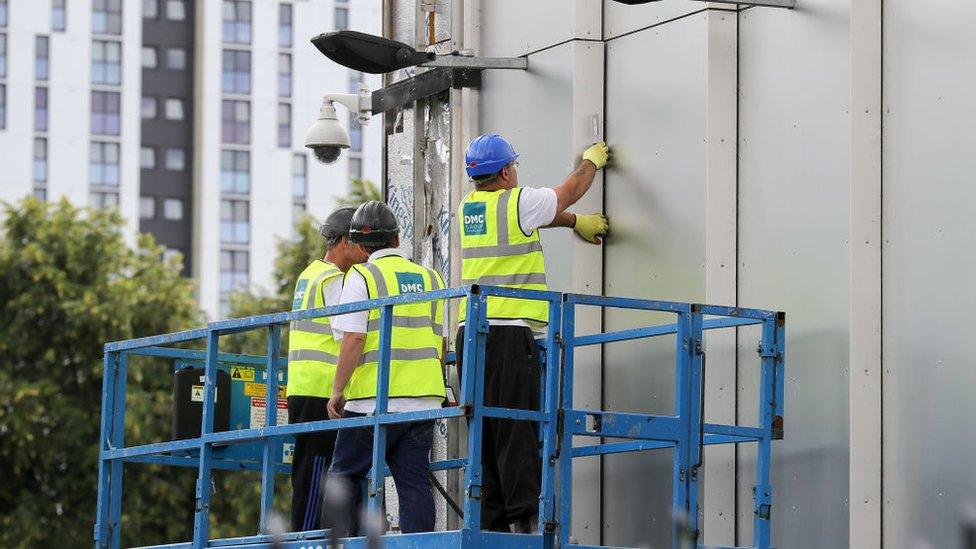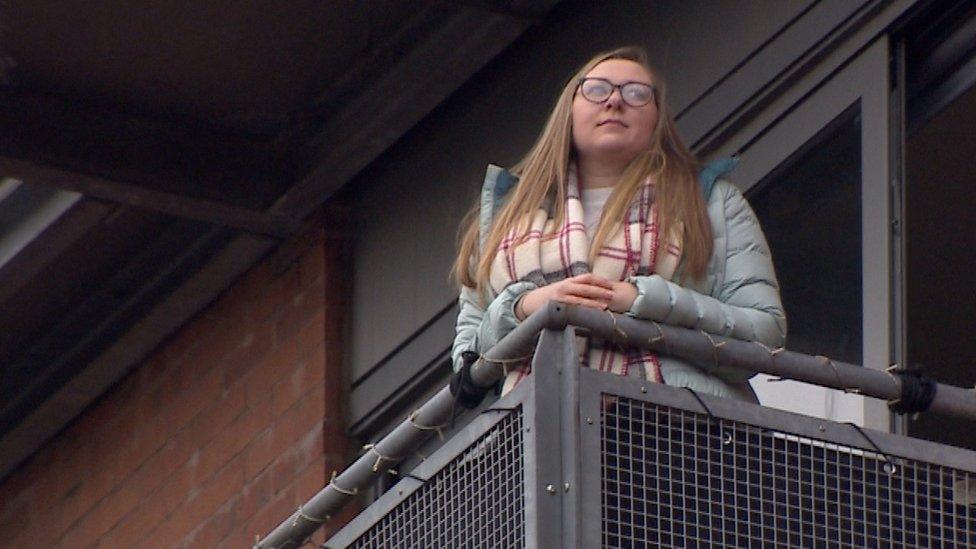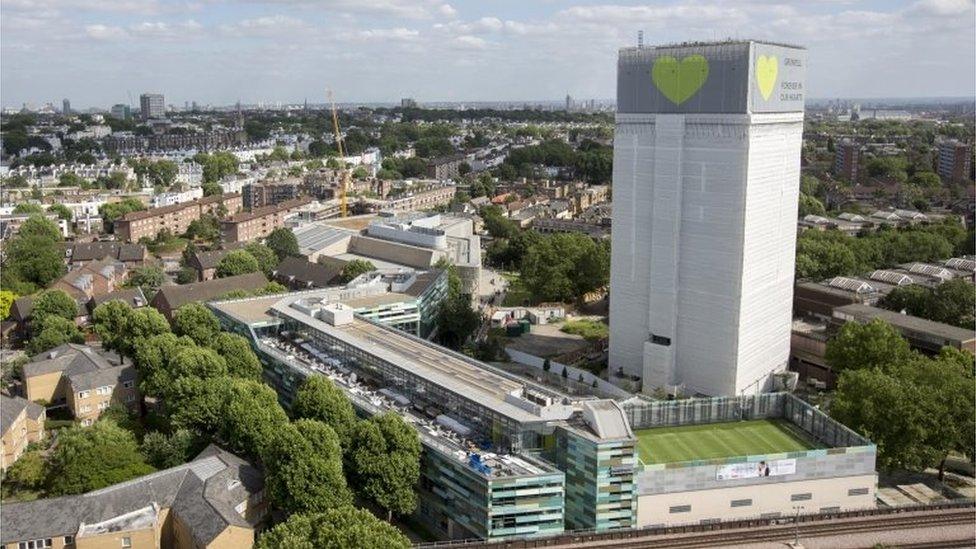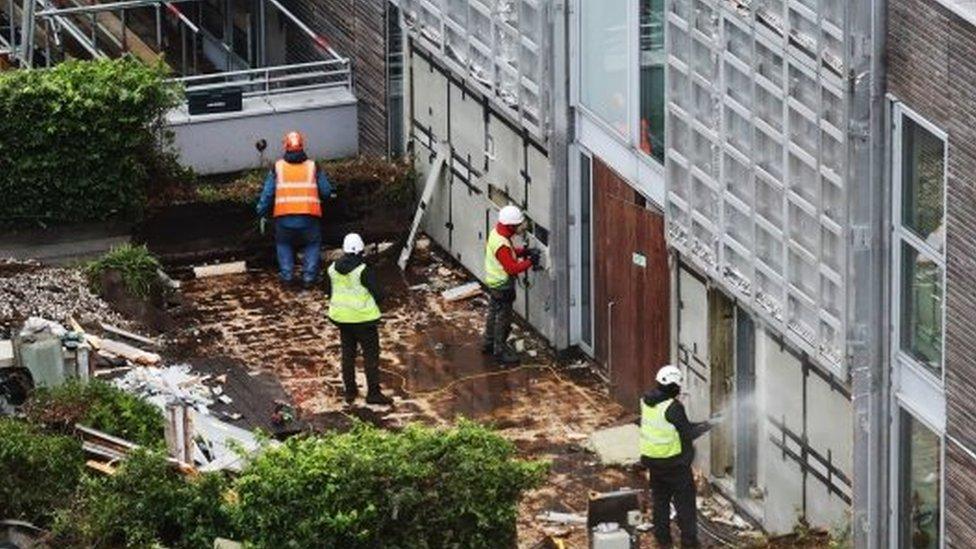Cladding: Extra cash to deal with crisis expected to be announced
- Published
"I didn't choose any cladding and now I'm going to be skint forever"
Further funding towards the cost of removing unsafe cladding on buildings is expected to be announced by the government.
Housing Secretary Robert Jenrick will make a statement to MPs shortly, but details of the plan are unknown.
Thousands of flat-owners are facing huge bills for fire-safety improvements after 2017's Grenfell disaster, when flames spread via combustible cladding.
The government announced a £1.6bn building safety fund in 2020 to help.
But pressure is growing on ministers to increase the pot for residents stuck in the buildings, with a committee of MPs estimating the total cost of the crisis could run to £15bn.
BBC Newsnight reported last month that the government had decided to allocate extra funding, possibly running into billions of pounds, to speed up the removal of unsafe cladding.
More than three and a half years since the Grenfell Tower fire, which killed 72 people, an estimated 700,000 people are still living in high-rise blocks with flammable cladding.
After Grenfell, round-the-clock fire patrols known as "waking watches" were put in place in hundreds of buildings, costing groups of leaseholders tens of thousands of pounds every month.
Fixing safety faults has seen costs surge for leaseholders, while residents have seen insurance costs on buildings with fire safety problems rocket.

Conservative MP Sir Peter Bottomley said ministers should accept that "the only tenants who are being asked to pay at the moment are leaseholders" and confirm they are "not responsible".
"They need to provide the money so that remediation can take place," he told BBC Radio 4's Today programme.
"Buildings should be made safe, they need to be made saleable - which means you can't have liabilities hanging around the necks of individual leaseholders."
Transport Secretary Grant Shapps told BBC Breakfast there has been "substantial help" available for those facing higher costs, but "needs are very high".
He acknowledged concerns among leaseholders - referring particularly to those who share ownership with housing associations or local authorities - that they "may be left out of this".
The Ministry of Housing, Communities and Local Government said work was "either completed or under way" on around 95% of the residential high-rises identified as having flammable ACM cladding at the start of last year, "with all works to be completed this year".
"We all want to see homes made safer, as quickly as possible and are already backing this with our £1.6 billion funding we are making good progress on remediating unsafe homes," a statement said.
It added that the government was "working at pace to develop further financial solutions to protect leaseholders from unaffordable costs".
But data released last month showed, external that cladding removal and repair work had been completed on only 58% of social housing blocks and 30% of private sector buildings.
Homebuilder Persimmon said it was putting aside £75m "towards any necessary cladding remediation and safety work" in 26 developments.
They include nine high-rise buildings where cladding may need to be removed - although Persimmon no longer owns the sites - and 17 smaller buildings that may be fitted with unsafe cladding and need investigating.

'We could go bankrupt'

"It is absolutely terrifying knowing that you are stuck here," says Amy
First-time buyer Amy Cottenden, who is 28, bought a one-bed flat in Metis Tower in the centre of Sheffield for £85,000 in 2017.
Inspections of the 14-storey building in the wake of the Grenfell Tower tragedy revealed it had the same type of flammable ACM cladding and other safety faults.
"It is absolutely terrifying knowing that you are stuck here," she said. "With lockdown, they are saying not to go out, but you are in a building where all you want to do is not be in it. You can't leave. You can't sell. My flat isn't worth anything until it is made safe."
While the government's Building Safety Fund is paying for the Grenfell-style cladding to be removed, the building has other fire safety faults, including missing fire breaks, that aren't covered by the scheme.
It could cost up to £6m to fix. Flat owners fear they may face huge bills of up to £50,000 each.
"We can't pay it and we shouldn't have to pay it. It is not our fault. We could all go bankrupt because of this," Ms Cottenden said.
A spokesperson for Rendall & Rittner, the company which manages Metis Tower, said: "We understand and sympathise with residents and owners about the uncertainty that this situation is causing and will do all we can to assist."
Read more: Cladding crisis: 'Delays could bankrupt us'

Labour's shadow housing secretary, Thangam Debbonaire, said it was "shameful" that "hundreds of thousands of people are still trapped in unsafe homes".
She added: "Whatever is announced will be too late for those first-time buyers who have already gone bust."
In an open letter to the chancellor, campaigning coalition End Our Cladding Scandal said Mr Jenrick's announcement should not be "another partial solution".
"If your government chooses to force us, the innocent victims of this crisis, into lifelong loans, of any size, this will be unacceptable, unfair and completely immoral," it said.
It said any proposal "must be adequate in size and scope to fully resolve this quandary", adding: "This is not just about billing the taxpayer ever higher amounts, but finding ways to make those who caused the crisis pay."
On Tuesday evening, the National Leasehold Campaign tweeted, external that it was "another sleepless night" for leaseholders "worried sick" about what Mr Jenrick was going to announce.
"Please don't help some and not others," it said.
- Published9 February 2021

- Published2 February 2021
